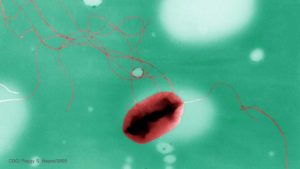A deadly E. coli outbreak includes five people in Arkansas and 11 more in Oklahoma, New York, Virginia, and Washington. The Centers for Disease Control and Prevention (CDC) announced yesterday that is investigating a five-state E. coli O157:H7 outbreak that is causing unusually severe infections including nine hospitalizations, three of them for hemolytic uremic syndrome (HUS) a form of kidney failure associated with E. coli infections. One person has died.
Contact the Pritzker Hageman E.coli Team
Phone: 1-888-377-8900 | Text: 1-612-261-0856
Investigators are still working to identify the exact food source. Genetic tests show the outbreak strain has been linked to previous outbreaks. Two of them were linked to produce, a 2018 outbreak linked to romaine lettuce grown in Yuma, AZ that killed five people, and a deadly 2020 E. coli outbreak where leafy greens were a suspected source. Previous outbreaks where recreational water and ground beef were identified as the source were also caused by the same strain.
While this is the time of year that lettuce is grown in Yuma, and the hospitalization rates are very similar to the romaine/suspected leafy greens outbreaks, the U.S. Food and Drug Administration (FDA) has not reported that it is investigating an E. coli outbreak. But the agency that regulates meat and poultry is.
Last night, the U.S. Food and Drug Administration’s Food Safety and Inspection Service (USDA FSIS) updated its Foodborne Outbreak Investigations page to include a new Listeria investigation and a new E. coli O157:H7 investigation both with unknown sources.

Noted E. coli Lawyer Eric Hageman said hospitalizations for E. coli cases can be difficult and expensive. The treatment for HUS, for example, includes transfusions, dialysis, plasma exchange or kidney transplant.
The 16 people sickened in this outbreak, who range in age from 10 to 95 years old, first developed symptoms of an E. coli infection on dates ranging from December 23, 2020, to January 7, 2021. Fourteen of the patients are female, two are male.
When someone develops an E. coli infection, state health departments use whole genome sequencing (WGS) to identify the genetic fingerprint of bacteria and then upload it to a national database managed by the CDC. Matching fingerprints indicate people likely got sick from eating the same food.

Symptoms of an E. coli infection include abdominal cramps and diarrhea that can be bloody. Because the illnesses in this outbreak are so severe, the CDC is urging anyone with the following symptoms to seek immediate medical attention:
- Diarrhea and a fever higher than 102°F.
- Diarrhea for more than three days that is not improving
- Bloody diarrhea
- So much vomiting that you cannot keep liquids down
- Signs of dehydration, such as dry mouth or throat, feeling dizzy when you stand up, not urinating (peeing) much.
The agency is also asking anyone who has these symptoms to help solve the outbreak by doing the following:
- Write down what you ate in the week before you got sick.
- Report your illness to your local or state health department.
- Answer public health officials’ questions about your illness.
If you recently developed an E. coli O157:H7 infection from contaminated food and would like a free consultation with an experienced E. coli lawyer, please contact the Pritzker Hageman E. coli Legal Team. We have represented clients in every major E. coli outbreak in the U.S. including those who battled HUS and families who suffered the wrongful death of a loved one. You can reach us by calling 1-888-377-8900, sending a text to 612-261-0856, or by completing the form below. There is no obligation and we don’t get paid unless we win.